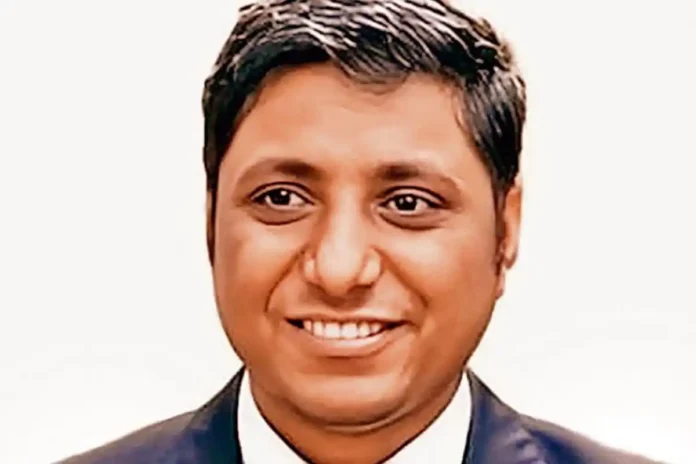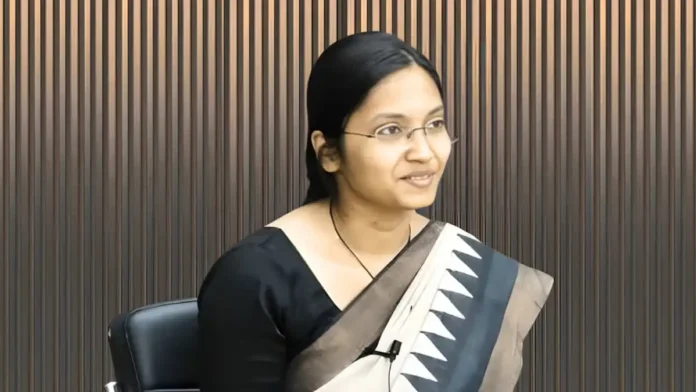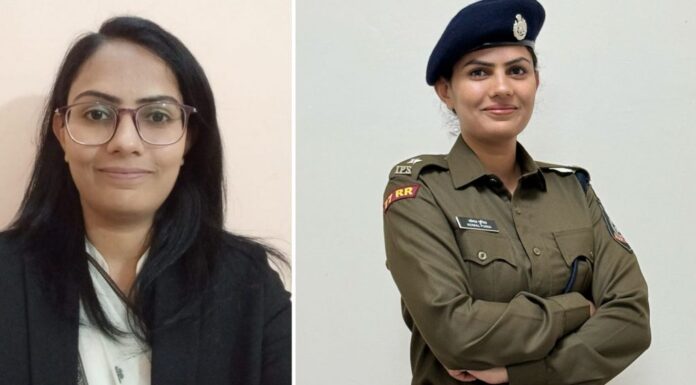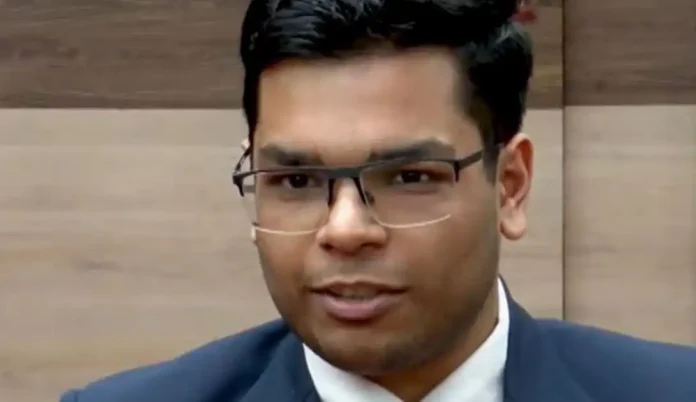In a competitive landscape like the UPSC Civil Services Examination, success is not merely about intelligence—it is a story of endurance, self-awareness, and continuous evolution. Raj Krishna Jha, a mechanical engineer from Bihar, embodies these qualities with clarity and grace. His incredible journey from multiple failures at the prelims stage to eventually securing All India Rank 8 in his fifth attempt in UPSC CSE 2024 is not just inspirational, but also deeply instructive for every aspirant navigating the challenges of this exam.
Early Life and Family Background
Raj Krishna Jha hails from Athari Panchayat in the Sitamarhi district of Bihar. His journey began in a modest, rural environment along the India-Nepal border. He studied up to Class 10 in a school located in Nepal, indicative of the limited but resourceful educational access in his formative years. Later, he completed his higher secondary education through the Bihar School Examination Board, showcasing academic determination in a region often constrained by infrastructural challenges.
He was born into a middle-class family. His father, Sunil Kumar Jha, worked as a private school teacher and played a significant mentoring role in Raj Krishna’s early development. Raj is the youngest of four siblings. His elder sister is a doctor, holding an MBBS degree, while his brother serves as a government engineer. The family has always emphasized the value of education, a foundational belief that deeply influenced Raj’s academic aspirations.
Academic and Professional Journey
Raj Krishna completed his Bachelor of Technology in Mechanical Engineering from Motilal Nehru National Institute of Technology (MNNIT), Allahabad, one of the premier engineering institutions in the country. He graduated in the year 2018.
Following graduation, Raj began working at Hindustan Petroleum Corporation Limited (HPCL) as an Assistant Manager in the City Gas Distribution (CGD) wing. Based in Kolhapur, Maharashtra, Raj balanced his full-time professional responsibilities while pursuing his UPSC preparation during evenings and weekends. His ability to manage a demanding corporate job alongside one of India’s most challenging competitive exams speaks volumes about his discipline and time management skills.
The UPSC Journey: Five Attempts and a Dream Fulfilled
First and Second Attempts (2020 and 2021)
Raj Krishna’s initial two attempts at the UPSC CSE did not yield success. He could not clear the Preliminary Examination in either of those attempts. Many aspirants would consider giving up after facing consecutive failures at the first stage. But Raj used these setbacks as feedback loops—diagnosing his mistakes, realigning his strategy, and deepening his conceptual clarity.
Third Attempt (2022)
He cleared the Prelims and Mains in his third attempt but could not make it into the final merit list. Despite this, his performance gave him confidence that he was moving in the right direction. He treated this outcome not as a failure but as a foundation to build upon.
Fourth Attempt (2023)
This was a particularly heart-wrenching moment in Raj’s journey. He secured 739 marks in the Mains written exam, falling just two marks short of the cut-off for final selection. It was a near miss that could demoralize any aspirant, especially after years of continuous effort. However, Raj took it in stride and used the setback as a moment of introspection and fine-tuning.
Fifth Attempt (2024)
With unmatched clarity, refined strategies, and unshakeable focus, Raj gave his fifth attempt in 2024. This time, he cracked every stage with excellence and secured All India Rank 8, etching his name among the country’s finest aspirants. The result was not an overnight miracle but a reward earned through years of consistent and conscious hard work.
Optional Subject: Geography
Raj chose Geography as his optional subject, a strategic decision given the subject’s scoring potential and alignment with General Studies papers. His understanding of physical geography, combined with current affairs and environmental issues, gave him an edge in presenting structured and analytical answers.
He focused on mastering the fundamentals through standard sources and enhanced his presentation using diagrams, flowcharts, and maps—tools that are invaluable in scoring well in the Geography optional.
Preparation Strategy
Balancing Work and Study
Raj’s strategy was heavily influenced by the fact that he was a full-time working professional. He typically studied 3 to 4 hours daily on weekdays after office hours and devoted 12 to 14 hours on weekends and holidays. He maintained a strict routine and consistently met his daily and weekly study targets.
Smart Resource Management
Raj was highly selective about study materials. He believed in using a limited number of reliable sources and revising them multiple times rather than drowning in excessive content. He also curated concise notes for revision, enabling faster and more effective learning.
Prelims Strategy
His approach for the Prelims centered on:
- Solid conceptual grounding through NCERTs and standard texts
- Rigorous practice using mock tests and previous years’ question papers
- Focused revision of static and dynamic topics
- Daily current affairs coverage and monthly compilations
Mains Strategy
Raj’s Mains strategy emphasized:
- Daily answer writing practice to improve articulation and time management
- Writing over 40 to 50 essays during preparation, each refined through feedback
- Use of structured frameworks: clear introductions, logically sequenced bodies, and concise conclusions
- Effective integration of data, reports, and examples to enhance the quality of arguments
- Presentation tools like flowcharts, diagrams, and subheadings for visual clarity
Interview Preparation
The Personality Test stage is often the most unpredictable. Raj approached it with authenticity, humility, and confidence. His preparation included:
- Thorough revision of his Detailed Application Form (DAF)
- Daily analysis of current affairs and issue-based discussions
- Simulated mock interviews at coaching centers and peer groups
- Deep self-awareness and honesty during responses
- Clarity of thought and calm composure during the actual interview
He viewed the interview as a conversation rather than an interrogation. His presence of mind and mature perspective left a strong impression on the board.
Traits and Values That Defined Raj’s Journey
- Resilience: Multiple failures never deterred him. Each setback became a stepping stone.
- Self-discipline: He showed incredible self-restraint by managing full-time work and consistent study without letting either suffer.
- Clarity of Purpose: Raj always knew why he wanted to join the civil services—to make meaningful contributions to governance and upliftment of marginalized regions.
- Analytical Thinking: His engineering background and love for Geography gave him a problem-solving lens in answer writing.
- Support System: His father’s mentorship, family’s emotional support, and peers’ encouragement helped sustain motivation over years.
Key Takeaways for Aspirants
- Failing Prelims is Not the End: Many toppers have failed Prelims in earlier attempts. Learn, adapt, and improve.
- Working Professionals Can Succeed: Time management and routine discipline are more valuable than full-day study marathons.
- Pick Optional Wisely: Choose based on interest, background, and scoring potential.
- Focus on Mains Presentation: Structured, visually enriched answers are critical to scoring high.
- Build Emotional Strength: UPSC demands mental stamina and emotional intelligence. Cultivate both.
- Consistency Trumps Intensity: Regular study—even if limited in hours—adds up to significant mastery over time.
Conclusion
The story of Raj Krishna Jha is one of remarkable perseverance, relentless self-improvement, and deep-rooted ambition. His journey proves that UPSC success is not about one genius moment but about sustained, smart work and the courage to stand up after every fall.
From a modest panchayat in Bihar to the elite ranks of the Indian bureaucracy, Raj has carved a path not just for himself but for thousands who dream of changing India from the grassroots up. His life, strategy, and values offer a comprehensive roadmap for every civil services aspirant.






